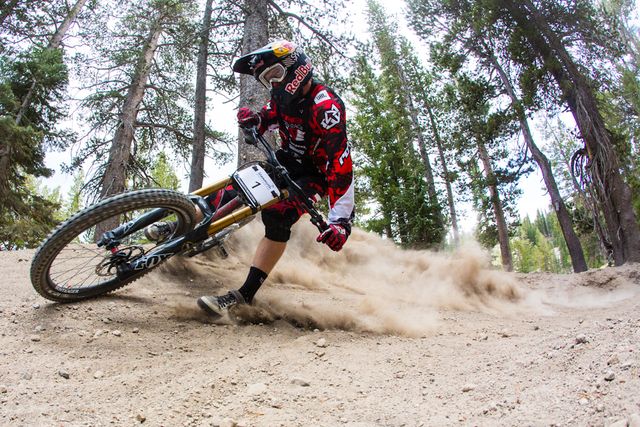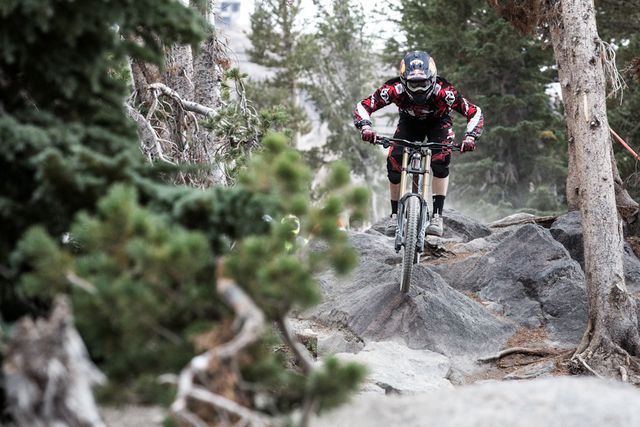
Before Southern California downhiller won the World Cup Overall last year, no American mountain biker had ever earned that title. Then 23 and racing in only his third season as a pro, Gwin, who grew up on the BMX and moto tracks, was so consistent in his results (including five victories) that he sealed up that title before the season had finished. He's dominated 2012 in the same fashion, winning four of the six events so far this year and clinching the overall before the final race in Hafjell, Norway.
Gwin's successes stem from a preternatural sense of balance and movement on the bike that he's gleaned from 19 years of riding. (Yep, he began BMXing at age four.) To watch him race is deceptive because he's so smooth and fluid that he makes very difficult courses . Those who know him also describe Gwin as a fastidious student of the sport and consummate professional who works out constantly and spends hours and hours practicing basic skills like cornering.
Having commanded the World Cup circuit for the last two years, Gwin has turned his eye to the World Championship race, slated for this Sunday, September 2, in Leogang, Austria. It's a course that Gwin has before, in the 2011 World Cup. We caught up with the rider last week on California's , where he was teaching a skills camp and putting the finishing touches on his preparations for Leogang.
You've completely dominated the downhill circuit for two years. What’s your secret?
I wouldn't say there's a secret,
just different pieces of the puzzle coming together at the right time. I feel
like my speed, fitness, equipment, and the people around me are just working
really well. I've got a few years under my belt now too, so I'm getting
better at knowing what I need to do in order to reach my goals.
You are the first American to win a World Cup overall title. Why
do you think Americans, who originated mountain biking, haven’t
been more successful?
I'm not sure really.
Probably because of the lack of organized downhill racing and the fact that at
least 90 percent of the World Cups are outside of the U.S. The sport seems to be
growing in the States though, so hopefully a few more kids can get up there real
soon.
There’s this misperception that downhill racers just show up and
go fast, and that winning is just a matter of how many risks you’re willing to
take. What do you say to that?
I think the sport is just as legit as any
others these days. The top guys all have full-time trainers, and there's a lot
of work and preparation that goes into winning races. It's not easy to win at
this level. You have to have everything in order to do well. I don't usually
feel like I'm taking big risks on my winning runs either. I've put in the work, and I know I'm capable of riding at that level.
What does a typical week of training look like
for you?
I usually train about six days a week, with one day off. I'm in the gym
around three times a week, on the cross country bike twice, and on the road
bike two or three times. We often have multiple sessions in the
same day as well. We also throw in some cross training on top of all
that, like running, motocross, and BMX to help keep it fun. We put in a lot of hours,
during the off season especially, so it's important to mix things up
occasionally to avoid burning out.
Based on your instruction at the camp, it seems you take a very
analytical and measured approach to racing. Can you describe that?
I guess it
comes from my background racing motocross. When I used to race moto a lot, I would
live with my trainer Mike Fedorow for weeks at a time. He spent endless hours
with me teaching proper technique. We would run through the same sections of
track all day so that those things became automatic when I was out on my own.
And it wasn't only technique but also learning line selection and how speed and
momentum carries around a track. I really liked that stuff, and I've carried that approach over to downhill racing. I feel like it's
a big reason as to why I'm successful now.
Describe the run-up to a big race.
We
usually have two or three days to learn the track, including a qualifying run in
there somewhere. I tend to do about three to five practice runs a day depending on how
fast I can learn the track. I tend to break a track down into sections
throughout the practice days so that I can learn them more in depth. By the
time racing rolls around I'm fully up to speed in every section so my race run
focus is toward linking each piece of the track together perfectly at the same
time.
You’ve had some nasty crashes. Is fear a big factor?
No, you can't let fear get in the way of doing what your
capable of. In extreme sports like ours, you're always going to have big crashes
once in a while. It's just part of the game. We don't ride reckless, but we know
that there is a risk doing what we do and we all accept that.

You recently announced that you re-signed with Trek for another
three years. Why?
I've been with Trek for two years, and the program has
been awesome. I feel like they provide me with the best equipment available and value my input. I'll
probably only race for another three to five years, so it was important for me to finish
out my career with a brand I believed in.
You ride a Trek Session 9.9. How important is
technological innovation in your riding?
My race bike is around 36 pounds complete, which is light for a
downhill bike. The frame is carbon fiber and everything else is pretty much
aluminum or titanium. I think technological innovation is important in downhill
but maybe not as much as in other forms of racing. You definitely have an
advantage on a good bike, but it's not like some other sports where if
you don't have the right equipment you almost can't win. With that said, Trek is always on that leading edge of development and we do a lot of testing
to make sure we stay there. It's crazy to me how much better they
keep making our bikes every year. It's definitely been cool to be a part of that
process.
With the spread of bike parks there’s a lot more interest in
the sport. Have you seen it grow?
Yeah, it's been awesome to see the sport growing again these last few
years. I definitely notice more people at the races and more people in general interested
in downhill. That was one of my main goals when I started racing: to help make
it better for the younger kids coming up and improve the quality of racing here
in the States. We're starting to get some mainstream media coverage and taking on some big sponsors like Red Bull TV for Internet coverage. And there's talk of TV coverage in the next few years.
Downhill mountain biking can be intimidating, from all the gear to the risks of crashing. Any advice for people who want to get into it?
For starters, it's
important to try it out for yourself. When people think of
downhill they look at events like the Red Bull Rampage, where guys are just
sending themselves off huge cliffs and hoping they can somehow ride it out.
That's a cool event for that crowd of people, but it's not downhill racing. If you ride within your abilities there's not as much risk involved as people
think. With the number of bike parks around these days, I see downhill mountain
biking more like skiing or snowboarding. There's trails for every level of
rider and programs and equipment that allow you to learn safely.
What are your long-term goals?
The same as when I started: to have fun and help the sport grow. I want to keep having
the coaching clinics I've been having and give back to the sport for all it has
given me. I've been around some form of racing since I was four years old and I
don't see that changing for a long time even after I retire.
Leogang is coming up. How do you rate your chances of winning it?
I haven't won the World Championships yet. It's a unique one-day race and anything can happen. I won the World Cup on that same track there
last year, and I feel like it's a pretty good track for me. I think I've got as
good of a shot at winning as anyone, so we'll just have to wait and see. I've
prepared the best I know how to, so whatever the result ends up being
I'll be content knowing I gave it my all.
—Aaron Gulley